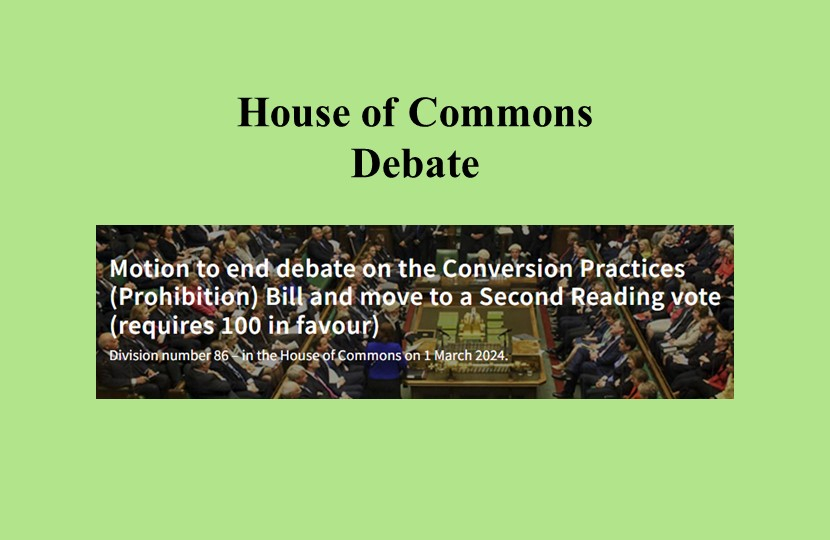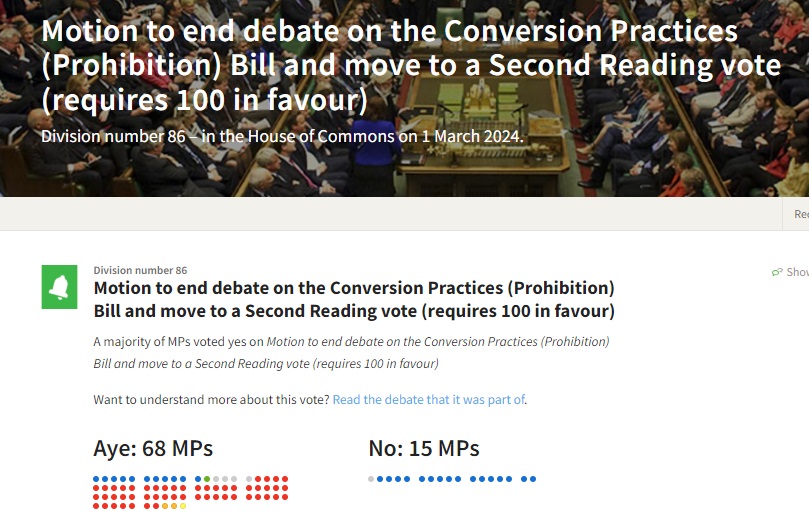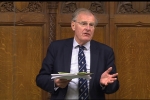
Chris Contributes In The Conversion Practices Debate
 Christopher Chope Conservative, Christchurch
Christopher Chope Conservative, Christchurch
Will my right hon. Friend give way?
 Liam Fox Conservative, North Somerset
Liam Fox Conservative, North Somerset
I will give way briefly because other Members still want to speak.
 Christopher Chope Conservative, Christchurch
Christopher Chope Conservative, Christchurch
Does my right hon. Friend agree that the noble Lord Winston put it well in the other place when he said,
“The basic problem is this: we are at risk of legislating for a piece of biology that we really do not understand. We do not understand the underlying mechanisms”?
—[Official Report, House of Lords, 9 February 2024; Vol. 835, c. 1847.]
 Liam Fox Conservative, North Somerset
Liam Fox Conservative, North Somerset
I would not want to contradict the noble Lord in any way whatsoever, but there are other elements of the Bill that give me cause for anxiety. I know those are part of the reason the Government have found bringing forward legislation difficult. We have talked on both sides of the House about the concept of the harm that could be done by these processes, but there is no test of harm in the Bill. If all forms of conversion therapy covered by the Bill can be harmful, surely it would not be unreasonable to have a test of intent to do harm prior to any prosecution being brought under the legislation, and yet that is not in the Bill. That is a vital part missing from the Bill, because that is about second-guessing people’s intent, rather than any concept of their wishing to do harm. That casts our net far too wide in law.
There are two other points about the drafting. The first is that the use of the term “activity”, as well as referring to a “course” of action, means that a single event—a one-off event, or a one-off conversation—could, if interpreted in a particular way by a prosecutor, bring people within the scope of the law. That needs to be tightened, and I say to my hon. Friend the Minister that if the Government are bringing forward legislation, that is something we need to look at, as is use of the term “suppress” alongside
“orientation or identity…in full or in part”.
Again, this loose language potentially comes unstuck when a parent has a strong and necessary challenge to make against their child in order to give them a different view. It could be interpreted very wrongly if this was the wording of any legislation.
Finally, I will say this: we are here to produce good law in the House of Commons; we are not here to signal to any one part of the population that we are on their side. We have to ensure that the law we produce has the intended effect and that that law is necessary. I hope my hon. Friend the Minister will look at these elements closely in the days and months to come.
-
Later in the debate...
 Christopher Chope Conservative, Christchurch
Christopher Chope Conservative, Christchurch
Is the hon. Gentleman referring to clause 4 and line 10 on page 3 of the Bill, where there a specific reference:
“to suppress a sexual orientation”?
 Neale Hanvey Alba, Kirkcaldy and Cowdenbeath
Neale Hanvey Alba, Kirkcaldy and Cowdenbeath
Yes. As I was saying, the document points out that the use of the Sentencing Acts definitions is “problematic” because the definition of
“‘sex’…is not settled in law and a Supreme Court Case on the subject is pending. ‘Transgender Identity’ is similarly problematic because the concept of ‘identity’ is wider than the equivalent protected characteristic” in the Equality Act.
The document moves on to the ineffectiveness of statutory defences, saying:
“While Clause 1(2) of the bill makes serious efforts to deal with concerns around prosecutions each defence raises serious issues in the following terms:
a. The religion defence is not a statutory defence at all because it cannot apply where a conversion practice has taken place. This means it is not an excusatory defence in criminal law. b. The ‘approval/disapproval’ defence is vague and ‘disapproval’ is not defined c. The ‘health practitioner’ defence is a complex three-part defence which places the ‘reverse burden’ on a Defendant. The definition of a ‘health practitioner’ at Clause 4 covers most but not all clinical roles, (unregulated therapists, counsellor, helpline operators or online forum moderators would not qualify). To rely on this defence, a health practitioner must also prove to the civil standard (i) they were complying with regulations (this term is not defined) (ii) that the action they took was reasonable and (iii) that there was no ‘predetermined outcome’. Placing reverse burdens on Defendants (particularly clinicians or similar) is generally considered to be undesirable because Defendants are not expected to prove their innocence. Legitimate clinical practice will sometimes have a predetermined outcome where a confident and clear diagnosis is made.”
I can think of examples where that would apply in clinical practice. (continues...)
- ENDS -
To read through the entire debate please:
-
This was deemed to be an unnecessary Bill, as highlighted in the debate, because existing laws cover the vulnerabilities associated in other ways.
Chris voted with the motion to end the debate, so the Conversion Practices (Prohibition) Bill will NOT move to a Second Reading.
The motion proposed was carried, with the Division result as show below:

- ENDS -
-


